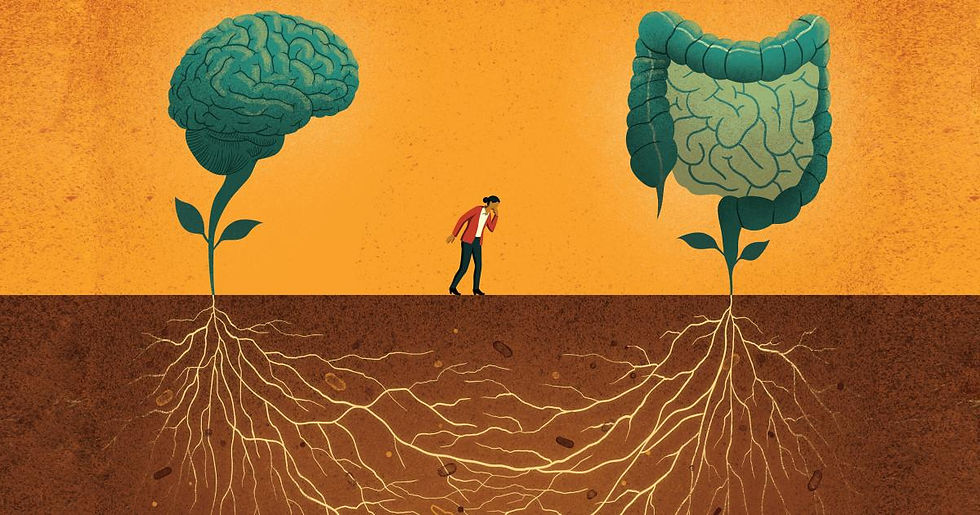Get Your Hands Dirty To Prevent The Flu
- backtoearthvermica
- Feb 23, 2025
- 4 min read
How digging in the soil can boost your immunity
Author: Alivia Sapone

Influenza A has been running rampant across the country this winter season. While the flu is typical this time of year and it may seem like nothing new, talk of the town says it’s been hitting us even harder than usual. Many of us have fallen victim to it, becoming bed-ridden for over a week and having to put our busy lives on pause to recover.
We get it - no one wants to talk about COVID-19 anymore. But more specifically, the COVID-19 pandemic in conjunction with the typical cold and flu virus has generated a wide awakening across the globe in recent years, prompting us to think, “How can I boost my immune system so this doesn’t happen again?” You may be wondering how this relates to soil, but surprisingly, the answer may be right beneath your feet. Dirty hands can lead to a cleaner immune system. Let’s learn how…
The Microbiome Connection: Soil Vs. Gut
Did you know research has shown that the tiny microbes in your gut are strikingly similar to the ones we find in soil? Exposure to these microbes can have immune regulating benefits that connect back to your very own gut microbiome. A healthy gut microbiome is a significant indicator of a functioning immune system, and even a clearer mind (which you may have heard as the gut-mind connection).

Why does this matter? These microbes in the soil aren’t solely supporting plant growth and an ecosystem below ground. They’re working hard to keep us healthy, too! In a 2022 study, researchers studied the differences in the microbiomes of gardening families compared to non-gardening families. It was evident that soil microbes were present in the gut of gardening families, suggesting the movement of microbes from soil to gut. Gardening families had higher abundances of several gut microbial species than non-gardening families - meaning that they were more exposed to a diverse microbial concoction with an abundance of healthy benefits!
Beneficial bacteria (like Bacteroides ovatus, Eubacterium, and Barnesiella) have been found to help control inflammation, repair the gut lining, support digestion and immune response, and even have cancer-fighting abilities. The more exposure we have to these microbes, the more we support our body’s natural defenses. It's clear that these tiny microbes are our friends who are here to help.

Reconnecting with Healthy Soil
It’s important to note—dirt is dead, but soil is alive. Playing in the dirt won’t have the same benefits as interacting with living, nutrient-rich soil. That’s why Back To Earth Works focuses on building and maintaining healthy soil with products designed to restore soil life, increase microbial diversity, and ultimately, support a thriving environment for plants, and for us. By taking care of the soil, we’re not just growing healthier gardens, we’re also nurturing our own well-being.
Getting our hands in the soil can be challenging during the winter months, especially for those of us living in colder climates where outdoor gardening isn’t an option. While immunity isn’t built overnight, small, consistent habits can help strengthen it over time. So, as we wait for the warmer months, let’s start thinking about how we can reconnect with the soil. Whether it’s through small indoor gardening projects or prepping for a robust spring garden, every step we take brings us closer to a healthier body and a healthier planet. You can get a headstart indoors by repotting or propagating indoor plants, composting, regrowing kitchen scraps, or trying windowsill gardening. Otherwise, start planning your spring and summer garden with Back To Earth Works’ Regenerative Gardening Kit designed to enrich your soil with essential nutrients and beneficial microbes for a thriving, nutrient-rich garden, both underground and within the gut.
Stay healthy and happy gardening!
References:
Brown, M. D., Shinn, L. M., Reeser, G., et al. (2022). Fecal and soil microbiota composition of gardening and non-gardening families. Scientific Reports, 12, 1595. https://doi.org/10.1038/s41598-022-05387-5
Ihekweazu, F. D., Engevik, M. A., Ruan, W., Shi, Z., Fultz, R., Engevik, K. A., Chang-Graham, A. L., Freeborn, J., Park, E. S., Venable, S., Horvath, T. D., Haidacher, S. J., Haag, A. M., Goodwin, A., Schady, D. A., Hyser, J. M., Spinler, J. K., Liu, Y., & Versalovic, J. (2021). Bacteroides ovatus promotes IL-22 production and reduces trinitrobenzene sulfonic acid-driven colonic inflammation. American Journal of Pathology, 191(4), 704–719. https://doi.org/10.1016/j.ajpath.2021.01.009
Mukherjee, A., Lordan, C., Ross, R. P., & Cotter, P. D. (2020). Gut microbes from the phylogenetically diverse genus Eubacterium and their various contributions to gut health. Gut Microbes, 12(1), 1802866. https://doi.org/10.1080/19490976.2020.1802866
Daillère, R., Vétizou, M., Waldschmitt, N., Yamazaki, T., Isnard, C., Poirier-Colame, V., Duong, C. P. M., Flament, C., Lepage, P., Roberti, M. P., Routy, B., Jacquelot, N., Apetoh, L., Becharef, S., Rusakiewicz, S., Langella, P., Sokol, H., Kroemer, G., Enot, D., Roux, A., Eggermont, A., Tartour, E., Johannes, L., Woerther, P. L., Chachaty, E., Soria, J. C., Golden, E., Formenti, S., Plebanski, M., Madondo, M., Rosenstiel, P., Raoult, D., Cattoir, V., Boneca, I. G., Chamaillard, M., & Zitvogel, L. (2016). Enterococcus hirae and Barnesiella intestinihominis facilitate cyclophosphamide-induced therapeutic immunomodulatory effects. Immunity, 45(4), 931–943. https://doi.org/10.1016/j.immuni.2016.09.009
.png)



Comments